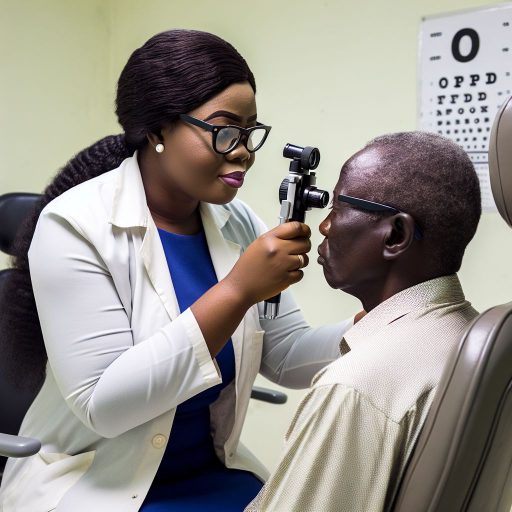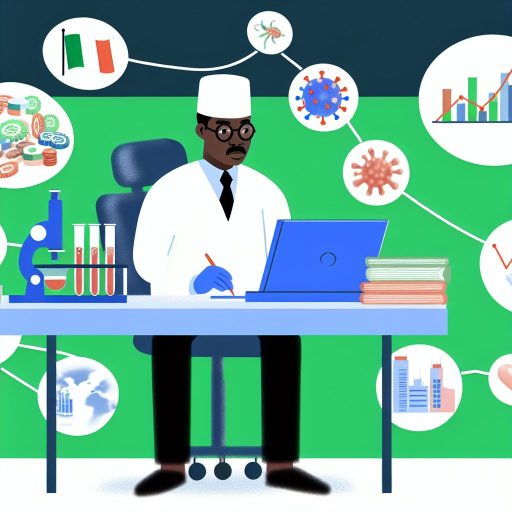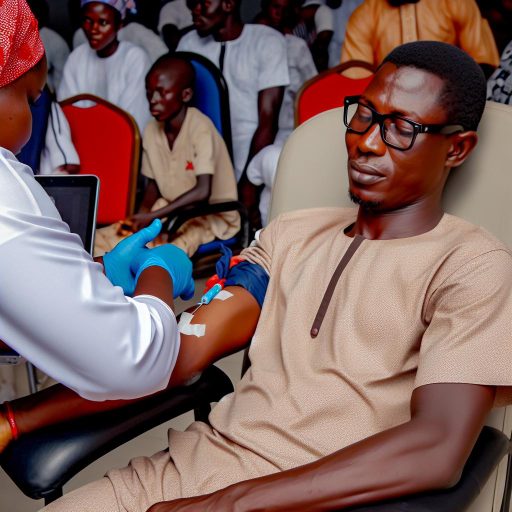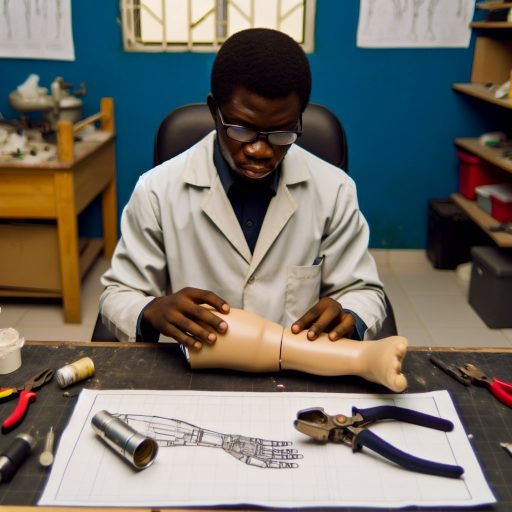Introduction:
Radiographers play a crucial role in healthcare by performing diagnostic imaging procedures such as X-rays and MRIs.
Their role is essential in providing accurate diagnoses and treatment plans for patients.
In the Nigerian healthcare system, radiographers are integral to the delivery of quality care.
This blog post will explore the impact of radiographers in Nigerian healthcare, focusing on their role in improving patient outcomes, enhancing healthcare services, and contributing to the overall efficiency of the healthcare system.
Role of Radiographers in Nigerian Healthcare
Radiographers play a vital role in the Nigerian healthcare system.
They perform diagnostic imaging procedures to assist in patient diagnosis.
Their responsibilities include operating imaging equipment and positioning patients correctly.
They also produce high-quality images for diagnosis purposes.
To become a radiographer in Nigeria, one must obtain a Bachelor’s degree in Radiography.
This degree must be from a recognized institution to be valid.
Additionally, they need to be registered with the Radiographers Registration Board of Nigeria to practice legally.
Radiographers can work in various settings such as hospitals and clinics.
They may also be employed in imaging centers and mobile health units.
In hospitals, they collaborate with radiologists to interpret images.
This collaboration helps in providing accurate diagnoses to patients.
In clinics, radiographers perform routine imaging procedures.
Common procedures include X-rays and ultrasounds that aid in patient care.
Imaging centers offer specialized services like MRI and CT scans.
Here, radiographers play a crucial role in obtaining detailed images.
Working in mobile health units allows radiographers to bring services to remote areas.
This initiative increases access to healthcare for underserved populations.
The training for radiographers equips them with necessary skills.
They learn to operate complex imaging equipment and ensure patient safety.
Radiographers also have the responsibility to communicate effectively with patients.
They ensure that patients understand the procedure and provide support during the process.
Their role is instrumental in improving early detection of medical conditions.
This contributes significantly to accurate diagnoses in the healthcare system.
Importance of Radiographers in Healthcare:
Radiographers play a crucial role in diagnosing and treating illnesses in Nigeria’s healthcare system.
They are essential members of the healthcare team, working alongside physicians to provide accurate imaging services for patients.
- Radiographers aid physicians in making accurate diagnoses through imaging techniques.
- They perform X-rays, MRIs, CT scans, and other imaging procedures to help identify medical conditions.
- By producing high-quality images, radiographers assist in detecting diseases early.
- They play a key role in monitoring treatment progress and ensuring patient safety during procedures.
- Radiographers help improve patient outcomes by providing vital information for healthcare decisions.
Overall, the contribution of radiographers in Nigeria’s healthcare system is significant.
Their expertise in medical imaging technology enhances diagnostic accuracy, leading to better treatment outcomes and improved overall healthcare quality.
Discover More: Career Paths in Medical Microbiology in Nigeria
Challenges Faced by Radiographers in Nigeria:
Radiographers in Nigeria encounter numerous challenges in their profession.
These issues significantly affect their ability to provide quality healthcare services.
- Identification of common obstacles radiographers encounter in Nigeria
- Discussion of issues such as inadequate equipment, limited resources, and understaffing
- Insights into how these challenges impact healthcare delivery in Nigeria
Inadequate Equipment:
Radiographers in Nigeria often face the challenge of working with outdated or malfunctioning equipment.
This can lead to inaccurate diagnosis and delays in patient care.
Limited Resources:
Another common issue faced by radiographers is the lack of essential resources such as contrast agents, protective gear, and maintenance tools.
This hampers their ability to provide quality service.
Understaffing:
Radiography departments in Nigerian healthcare facilities are frequently understaffed.
This leads to increased workloads and burnout among radiographers.
Transform Your Career with Expert Guidance
Get personalized mentorship consulting that’s tailored to your unique path. Our expert advice is actionable and exclusive.
Get StartedConsequently, this can result in compromised patient care and safety.
Impact on Healthcare Services:
These challenges significantly impact the delivery of healthcare services in Nigeria.
Patients may experience delays in diagnosis, incorrect treatment plans, and overall subpar healthcare quality.
Recommendations:
To address these challenges, it is crucial for the Nigerian government and healthcare institutions to invest in modern equipment.
Additionally, providing adequate resources and hiring more radiography staff can alleviate the burden on existing professionals.
Improving Radiography Services in Nigeria
By recognizing and overcoming the challenges faced by radiographers in Nigeria, healthcare services can be improved.
This leads to better patient outcomes and overall healthcare system efficiency.
Find Out More: Post-Procedure Diet for Restorative Dental Patients
Technological Advancements in Radiography:
Advancements in imaging technology have transformed radiography.
Digital radiography provides clearer images and faster results.
3D imaging allows for better visualization and diagnosis.
These innovations have greatly benefited radiographers in Nigeria:
- Increased accuracy in diagnosing conditions.
- Quicker turnaround time for patient care.
- Improved patient comfort during imaging procedures.
Furthermore, there is potential for more advancements in radiography:
- Integration of artificial intelligence for image analysis.
- Development of portable imaging devices for remote areas.
- Implementation of tele-radiology for consultation and diagnosis.
Technological advancements in radiography have revolutionized the field.
They have the potential to further enhance healthcare in Nigeria.
You Might Also Like: Prominent Paediatricians in Nigeria
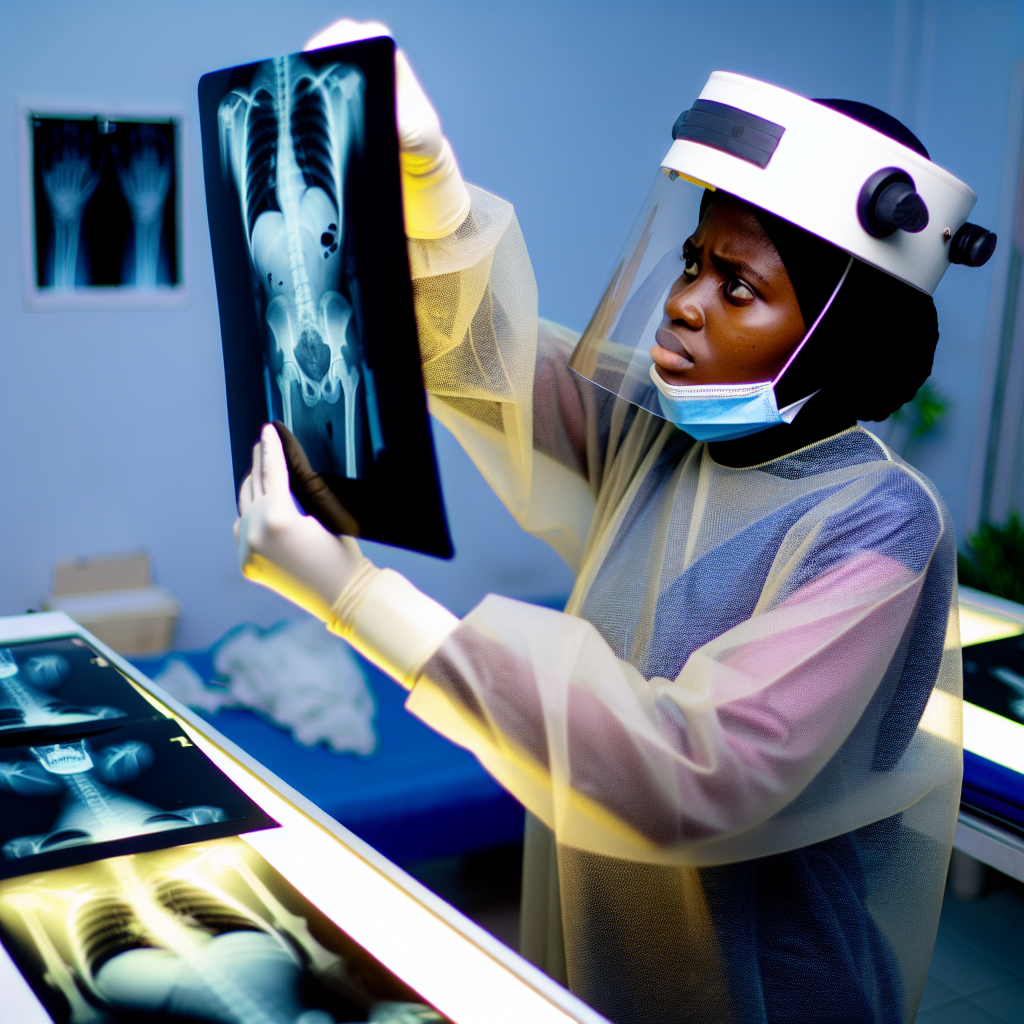
Role of Radiographers in Public Health in Nigeria
Radiographers play a crucial role in public health initiatives in Nigeria.
They actively participate in various programs aimed at improving the overall health of the population.
Radiographers are integral members of public health teams.
They provide essential diagnostic services to help identify and manage health conditions in communities.
Through imaging screenings and diagnostic procedures, radiographers aid in detecting diseases.
They contribute to health awareness campaigns to increase awareness about various health issues.
Radiographers educate individuals on the importance of preventive healthcare practices.
They encourage individuals to adopt healthy lifestyles and seek regular screenings.
This approach helps in the early detection of diseases.
Radiographers play a key role in detecting diseases such as cancer and cardiovascular conditions.
They utilize imaging techniques leading to early intervention and better treatment outcomes.
The involvement of radiographers significantly contributes to the promotion of preventive healthcare measures.
They enhance early disease detection as well as increase health awareness among the population in Nigeria.
Uncover the Details: Anatomical Pathology Equipment Used in Nigeria
Collaboration with Other Healthcare Professionals:
Collaboration between radiographers and other healthcare professionals is crucial in the Nigerian healthcare system.
This partnership ensures comprehensive patient care and improved healthcare outcomes.
Importance of Collaboration:
- Radiographers work closely with doctors, nurses, and other medical professionals to provide accurate diagnosis and treatment.
- Collaboration allows for a multidisciplinary approach, leading to better patient care and treatment planning.
- It ensures that all aspects of a patient’s health are considered, resulting in more effective and holistic care.
Teamwork and Communication Skills:
- Effective teamwork is essential for successful collaboration between radiographers and other healthcare professionals.
- Open communication helps in sharing information, coordinating care, and making informed decisions for patients.
- Strong interpersonal skills are needed to build trusting relationships and work together towards common goals.
Benefits of Interdisciplinary Collaboration:
- Improved patient outcomes are seen when healthcare professionals from different disciplines come together to share expertise.
- It leads to more accurate diagnoses, timely interventions, and personalized treatment plans for patients.
- Collaboration reduces errors, enhances efficiency, and promotes a more patient-centered approach to healthcare delivery.
Collaboration between radiographers and other healthcare professionals in Nigeria plays a vital role in ensuring quality patient care and successful treatment outcomes.
By working together as a team, healthcare providers can leverage their individual strengths to deliver holistic care and improve the overall health and well-being of patients.
Role of Radiographers in Nigerian Healthcare
Radiographers play a critical role in the Nigerian healthcare system.
They provide essential diagnostic imaging services.
Their expertise in interpreting images accurately contributes to accurate diagnoses and treatment plans.
Additionally, they ensure patient safety by following strict protocols during imaging procedures.
The impact of radiographers on healthcare in Nigeria is significant.
They are integral members of the healthcare team.
Working behind the scenes, they aid in the treatment of patients.
Their dedication to their profession is commendable.
They are committed to delivering high-quality care.
This makes them invaluable assets to the healthcare system.
Readers should appreciate the significant contributions of radiographers to healthcare in Nigeria.
By recognizing their importance, we can support and empower these professionals.
This will enable them to continue providing exceptional services to patients across the country.
Let us continue to value and respect the hard work and dedication of radiographers.
They are shaping the healthcare landscape in Nigeria.
Additional Resources
Patients’ reaction to the ethical conduct of radiographers and staff …
View of Digital Healthcare Tools in Nigeria: Strengthening Public …

